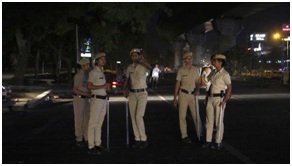The Delhi government has said that a pan-city safety audit – to find infrastructure problems in public spaces across the national capital – will be conducted over the next eight months. The audit will be carried out by NGO Safetipin. The move comes after the Delhi cabinet, headed by Chief Minister Arvind Kejriwal, approved the proposal that was initially moved by the Women and Child Development Department.
The NGO had, in 2016, conducted a safety audit of the national capital over a period of four months. That survey had found that Delhi had 7,438 dark spots. Taking cognizance of the report, the government and the municipal corporations have, so far, managed to illuminate 70 per cent (5,472) of the dark spots. Kalpana Vishwanath, co-founder and CEO of Safetipin, said: “The scope of work for this new audit is much wider than the previous one. While in the 2016 survey, we focused mostly on lighting, this time, we are going to look into walk-paths, public toilets, parks, tourist spots, bus stops etc. We will take seven months to complete the audit.”
Stating that teams have been readied to start mapping the city on the basis of nine parameters, Vishwanath said the NGO is yet to get a start date from the government. A media adviser to the Chief Minister said the order will be issued in a week’s time.
In an official statement, the government said, “There will be active involvement of Delhi government departments in undertaking this survey as well. The stakeholders include the transport department, the four municipal corporations, (North, East, South DMC, and New Delhi Municipal Council), the Delhi Urban Shelter Improvement Board (DUSIB), educational institutions and road owning agencies such as Public Works Department (PWD) and Delhi Development Authority (DDA).”
Besides, the government statement read that the Delhi Cabinet has also sought a detailed report of the previous survey, including the list of black spots and how many lights were installed following the survey. The step assumes significance as Delhi, which spans over 1,483 square kilometres, has an average density of 225 persons per hectare. According to the national crime records bureau (NCRB), of the four mega cities in the country – Delhi, Mumbai, Chennai and Kolkata – Delhi has the highest rate of crimes registered on charges of murder, rape and outraging the modesty of a woman.
“This perception of Delhi directly affects the manner and the extent of women’s access to public space. The audit will involve large-scale data collection from the city’s streets and public spaces using two apps — My Safetipin for crowdsourced data and Safetipin Nite to collect night time pictures of the city,” a government official said. The official said mobile phones will be mounted on windshields of cars to capture photographs. These photographs will be then assessed on a wide range of parameters linked to safety in public spaces.








